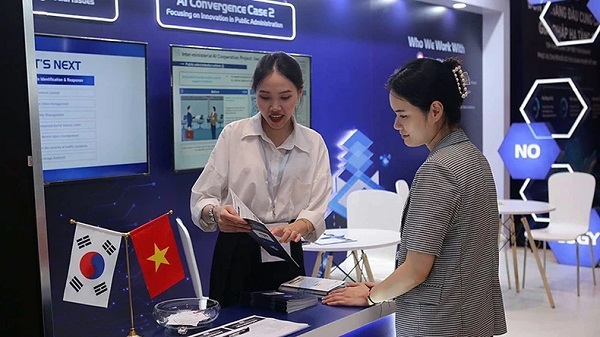
Despite achieving encouraging initial results, Vietnam's
research, development, and application of artificial intelligence (AI) face
numerous challenges. Without timely solutions, there is a risk of missing out
on developmental opportunities.
At the Vietnam AI Day, which was organised under the direction of the Ministry of Science and Technology, various AI application products were showcased, such as ultrasound image processing, fetal prediction images, specialised chatbots supporting businesses and programmers, and computer vision products.
According to the Ministry of Science and Technology, AI has recently been applied and implemented in various ministries, sectors, and localities. It has supported the automation of state management processes, having been used in national defence and security, as well as in agriculture, construction, natural resources and environment, finance and banking, industry and commerce, culture, sports and tourism, and broadcasting. AI technology has significantly contributed to increasing labour productivity and improving people's quality of life.
Looking at the AI products developed recently, some domestic technology corporations and enterprises have invested in research and development based on Vietnam's unique data and knowledge to meet the needs of local users.
At Vietnam AI Day, for the first time, generative AI products (technology that creates or produces new content) were introduced in the form of virtual assistants, helping businesses optimise their processes. This demonstrates that local technologists are keeping pace with global trends, unlocking the vast potential of this cutting-edge technology.
According to the Standing Deputy General Director of Misa Corporation, Le Hong Quang, generative AI is expected to contribute 14 trillion VND to Vietnam by 2030. Currently, the adoption of generative AI is still limited, with only 36% of businesses exploring it and 9% already implementing it.
While initial achievements have been made, AI development in Vietnam still faces many challenges, such as a shortage of high-quality human resources, limited infrastructure, and an incomplete legal framework for this sector.
According to Associate Professor Dr Dinh Ngoc Minh, Deputy Head of the Faculty of Science, Engineering, and Technology and Head of the Master of Artificial Intelligence Programme at RMIT University, the demand for AI experts and engineers far exceeds the current number of qualified individuals. Therefore, investment in training and education is necessary, along with enhanced collaboration between educational institutions and businesses, to develop specialised AI training programmes. This includes building joint training, internship, and research programmes with businesses to meet the labour force demand in this field. The number of AI professionals is limited and scattered and lacks connection and collaboration on national-level projects.
In recent times, incomplete and uncoordinated information technology and telecommunications infrastructure have hindered the ability to deploy large-scale AI solutions. Many technology enterprises have expressed their desire to share access to advanced and high-speed computing systems to train new-generation AI models, which could be provided by public research institutions or large corporations.
Universities and technology companies in Vietnam must currently rent machines from foreign providers at high costs, which poses the risk of exposing confidential information. In this context, leveraging infrastructure resources for overall development cannot happen without the state's support policies.
Although the number of enterprises applying AI is increasing, the overall rate remains low, with most companies only applying AI in a few small-scale tasks. The main reasons for this are limitations in awareness, financial capacity, and infrastructure. AI must be fully integrated into all business operations, truly adding value to businesses.
Implementing AI in businesses depends not only on technology and the readiness of enterprises but also on many other factors, such as the business environment and legal framework. Recognising the role and importance of AI in the country’s socio-economic development, the Party and Government have issued numerous mechanisms and policies to promote AI research, development, and application.
One of the most important legal documents is Decision No. 127/QD-TTg, issued on January 26, 2021, regarding the "National Strategy on Research, Development, and Application of Artificial Intelligence by 2030". This strategy sets specific goals to promote the research, development, and application of AI, turning it into a key technology field for Vietnam in the Fourth Industrial Revolution while also contributing to the country's socio-economic development and enhancing Vietnam's position in AI research and application, both regionally and globally.
Many opinions suggest that the National Strategy needs to be concretised into mechanisms, policies, and regulations to ensure a comprehensive legal framework for developing and applying AI products. This includes aspects such as pricing AI applications, bidding for technology products, and the development of responsible AI.
Unlike traditional technologies, which have been an advantage for developed countries, AI is seen as an opportunity for developing countries, including Vietnam, to leap forward. Vietnamese technologists assert that they will turn challenges into opportunities to advance AI development in Vietnam.
Le Hong Quang said that in the near future, his company’s products and solutions will integrate AI with the criteria of easy access, cost savings, and quick effectiveness. This approach will help businesses, notably small and medium-sized enterprises (SMEs), to adopt AI, enhancing their competitiveness in the market and contributing to the country's economic development.
FPT Corporation has also invested in and provided infrastructure services for computing and training AI models, particularly in generative AI applications requiring significant computing power.
Professor Vu Ha Van, Scientific Director of VinBigdata, emphasised the importance of mastering generative AI applications to leverage the data of Vietnamese users, which foreign applications may find difficult to access.
Deputy Minister of Science and Technology Bui The Duy confirmed that the ministry will enhance connections to build a strong AI ecosystem in Vietnam, contributing to socio-economic development and promoting national productivity and quality improvements.

 Previous page
Previous page Back to top
Back to top







